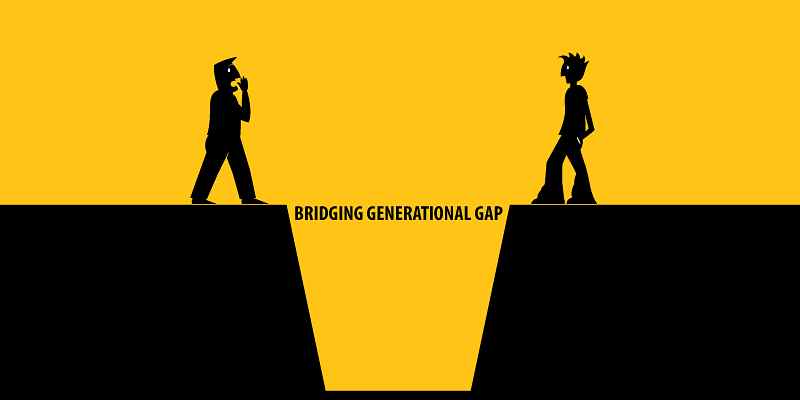- Umang Sagar
- Psychology, Recent article, Social Issue
Generational Conflicts

When the interests or ideals of one generation collide openly with those of another, generational conflict occurs.
Our perspective on work, relationships, and our place in the world is shaped by the era in which we grew up, but what we need and want at any given time is determined by our circumstances. Our life stage and professional stage have an impact on what we desire, anticipate, and require in order to be happy and productive. Generational conflicts are frequently about who has the power to call the shots and who must comply. There are no technical solutions to this perplexing issue. If you want to fix the problem and live in peace, both generations must be willing to work together to find a solution. If one generation refuses to accept the adjustments, the other must compromise to a greater degree, which may or may not be doable.
Meaning

Generation means a group of persons who were born and raised in the same area at the same time.
There appear to be variances in people’s values, beliefs, and attitudes between generations. While some people are certain that the differences exist, others believe that they are a myth. Those who believe in the differences argue that they are crucial to acknowledge and adapt, particularly in workplaces with multiple generations, such as today. While the age gap can be the source of some big tensions between generations in families, it’s also worth noting that it can also result in some adorable moments. As a result, dealing with parents and grandparents as children, adolescents, or fully autonomous adults has its own set of turbulence and warm moments.
Causes

- This contradictory problem is caused by a number of issues.
Their mental frameworks differ due to the differences in their upbringing. Physiological and behavioral patterns are created as a result of one’s experiences. When people from various generations meet, they frequently encounter differences of opinion, communication gaps, disputes, and other issues.
Everyone wants to live and act in their own way, and no one wants to give up their principles and beliefs. Between the younger and older generations, there has always been an attitude gap or a lack of understanding. This mentality has increased generational conflicts. This chasm has now begun to negatively affect our lives.
Because of the differences in mental structure, likes and dislikes differ as well. Both sides are unable to live in peace with each other in this manner, and they are unable to appreciate each other’s likes and opinions.
Older individuals, it turns out, are more prone to believe that today’s youth lack respect for authority, whereas well-educated adults are more likely to regret the fact that adolescents nowadays never seem to read. Given decades of increased intellect both nationally and worldwide, more educated people are also more prone to believe that young people are becoming stupider.
The frequency of thoughts flows in a parallel manner from different directions. When the two persons’ cognitive processes are so dissimilar, love cannot be conveyed, even if it exists between them. Both of them are unable to find an appropriate outlet for their emotions. As a result, a chasm develops between the two generations.
Children used to have a broader perspective and would not accept the old ways of doing things. They like to do things in their way rather than following rules. During adolescence, most young people experience generational conflict. They are frantically looking for a sense of self-identity. Sometimes parents are unable to comprehend the demands of today’s fast-paced environment. Ultimately, despite their love and affection for each other, they are both feeling exhausted and are unable to comprehend each other. As a result, there is a breakdown in communication and a willingness to abandon relationships.
It’s always beneficial to have a diverse set of ideas, perspectives, and viewpoints. It shows how we are growing and progressing, but it can be concerning when the thoughts and ideas of both generations are not acknowledged. In their thoughts, parents form a mental image of their offspring. They want to instill in their children the same values that they were raised with, and they want their children to do the same. Parents want their children to act in accordance with their values because they believe it is in their best interests this use results in generational conflicts.
Generational Conflicts In India And Other Countries

Since ancient times, India has been a country where family status has been of paramount importance. India is famed for its cultural variety and collectivism. In India, families are bound together by an unseen bond of cooperation, peace, and interdependence. Here, togetherness reigns supreme. Every successive generation takes a different path than the one before it, but the chasm has never been wider than it is now in India.
Grandparents pay attention to the company the child keeps, his or her eating habits, and entertainment choices, among other things. All of these are potential conflict areas that require a third party to act as a buffer between the child and the parents; this third party is the “Grandparent.”
The aged men and women in the family serve as the family’s watch person. In Indian expectations of one generation from the other generation are becoming a reason of generational conflicts.
The population of the United States is currently divided into six generations. The Greatest Generation (born before 1928); the Silent Generation (born between 1928 and 1945); the Baby Boomer Generation (from 1946 to 1964); Generation X (from 1965 to 1980); the Millennials (born between 1981 and 1996), who make up the majority of the population; and Generation Z (born after 1996). (born from 1997 to 2012). However, the age range of the generation after 2012 has yet to be decided. These generations were all born into a different America because of the vast age gap between them.
In America, generational disparities have long been a role. These schisms are at their widest in decades, with the potential to affect generational conflicts for decades to come.
Two younger generations, Millennials and Gen Xers, stand out from the two elder cohorts, Baby Boomers and Silent’s, on issues such as immigration and race, as well as foreign policy and government scope. Millennials continue to have a distinct – and increasingly liberal – perspective on many subjects.
Effects
The generational divide has serious effects, as the two sides have already begun to emotionally drift apart.
There is a generation conflict between parents and children, as well as between in-laws. It happens with professors and students as well, although the distance is smaller because they don’t spend much time together. This difficulty causes a communication breakdown, as both parties are unable to understand the communication channel.
Arguments over trivial topics and disagreements become more common as a result of emotional incompatibility. Everyone’s tranquility has been disturbed.
In the worst-case scenario, the people decide to break up. Due to a persistent shortage of emotional space, the youngsters decide to leave their parents’ home. To cope with excessive demands, the daughter-in-law may encourage her husband to abandon her mother-in-law for incapacity.
How To Overcome

Generational disparities need to be fostered with great care, thus it’s crucial to bridge the generational divide. It’s time to accept that neither side is totally correct or incorrect. Both generations must improve their mutual understanding and acceptance. Having a calm conversation with each other with the goal of resolving disputes in ideas amicably, altering their perspective for each other, and reaching a common ground might be the most effective tool for dealing with generational conflicts.
Whether or not there are significant differences between generations, difficulties might occur, particularly when unfavorable preconceptions about generations are spread, such as that traditionalists are dogmatic, baby boomers distrust technology and millennials are lazy. Everyone should inquire about what each individual values and how they will be comfortable. One should communicate with individuals in the manner in which they prefer to be communicated with.
Recognize and acknowledge your own biases. We all have them, and they have a big impact on what we see and don’t see.
Recognize that there are many distinct motivators, and each person may be motivated by something completely different.
Arrange for people from various generations to interact with one another. One of the most effective ways for individuals to overcome differences is to use humor.
Workplace tensions and confrontations are on the rise. Solicit thoughts from people of various generations to see if there are any trends in the causes. It’s best not to bring up generational stereotypes. Many people may find this offensive. People desire to be acknowledged for their uniqueness.

During their growing years, both generations must study the ways of society and have mutual respect for it. Both parents and children must give each other space and specify specific boundaries that the latter must accept in order to prevent friction between the two generations.
Because society is continually changing, there is a generation gap. Both generations must work together to bridge the gap with love, affection, and trust. Both generations should accept each other’s perspectives and viewpoints, and proceed cautiously with society’s progress.
Both generations should recognize the peace that may be achieved via cooperation. When both generations work together, the duties can be completed in a very calm manner. For example, this issue frequently arises between a mother-in-law and her daughter-in-law. The mother-in-law should understand that her daughter-in-law is accustomed to the environment of education and profession, and that juggling home responsibility is not an easy task for her. At the same time, the daughter-in-law should recognize that her mother-in-law was not fortunate enough to have had her parents educate her, and as a result, she is unable to be professionally competent and grasp the professional world. Everyone should work on developing the quality of mutual respect. Peace can be formed between the two parties if one learns to respect the other. A mother-in-law should understand that today’s women work in pain to provide for their families. At the same time, the daughter-in-law should be aware that her mother-in-law has gone through a lot of suffering in order to raise her family, as well as many economic and social difficulties.
Conclusion
- The generational conflicts are arises from the distinct natures of each individual. No one can close the generation gap, but you may certainly choose to close it in some way. Both parties should make an effort to improve their relationship with one another. The generation gap may generate family conflict, but if you strive to comprehend another person’s perspective and pick a middle ground, you can have a happy living family. No one wants to live in a tense environment, and you will always need your elders by your side because they are the ones who care for you. They may have different ways of expressing their love and care for you, and you may feel awkward, but you must learn to understand them and their ways.
Top 13 Important Facts About Generational Conflict
57 percent of young people use the internet daily compared to 27 percent of older people this has widened the generation gap.
During a study, about 75.8 percent elderly claimed that generational conflicts have increased more rapidly during the past two years due to COVID-19.
The generation gap has widened due to overstretched spells of coronavirus and related lockdowns/ restrictions like social distancing.
According to a study, 81 percent elderly complained that the ever-widening generational conflicts are responsible for the poor status of human rights of the elderly.
The Covid pandemic has imposed many challenges before older people, from social isolation, financial penury, psychological issues to elder abuse and neglect.
Only 7 % boys and 4 % girls (aged 15 -24) use to discuss growing up issues with their parents.
The disapproval of love marriages by parents in India is a major reason for generational conflicts.
Besides the disapproval, the reaction of parents after line marriages and denial in accepting them leads to an increase in generational conflicts.
Technology has played a profound role in increasing generational conflicts.
The stubbornness in youth and being short-tempered is also a reason for this issue.
Generational conflicts at workplaces are becoming an alarming issue.
Generational conflicts have severely led to increases in depression and other health-related issues.
- Generation gap often refers to a perceived gap between younger people and their parents or grandparents.




